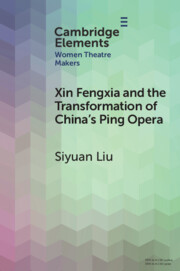Element contents
Xin Fengxia and the Transformation of China's Ping Opera
Published online by Cambridge University Press: 26 August 2022
Summary
- Type
- Element
- Information
- Series: Elements in Women Theatre MakersOnline ISBN: 9781009083508Publisher: Cambridge University PressPrint publication: 15 September 2022
References
- 8
- Cited by

